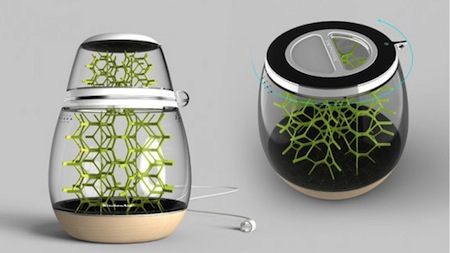Environment & Energy
Related: About this forumHungry? Grow Nutritious Insects At Home
Mansour Ourasanah has created the Lepsis, an attractive insect breeder that could be used to grow grasshoppers in an urban home. Should you be including (more) insects in your diet?

(Lepsis insect habitat)
Ourasanah collaborated with KitchenAid to develop the Lepsis, a small, decorative unit that can rest on a kitchen counter. The unit addresses the question of how to produce large amounts of protein without devoting more land space to the cultivation of insects, and it was just announced as a finalist in the INDEX awards. According to Ourasanah, 80 percent of the world population already eats insects, and introducing edible bugs to rapidly-expanding urban populations could significantly reduce the impact of meat production on the environment.
The Lepsis is a vessel that can be used to grow insects for food. The product consists of four individual units that are each designed to breed, grow, harvest and kill grasshoppers, and they combine to form a decorative kitchen product. “In order to move toward a sustainable future, we must do away with our culinary hangups and redefine the paradigm of food,” explains Ourasanah.
In his 1994 story NatuLife, sf author David Brin gives us a taste of this very future:
"Come on, honey, try one. They're delicious."
Gaia had the hive uncrated and warmed up by the time I got home. Putting down my briefcase, I stared at hundreds of the pasty-scaled critters scrabbling under a plastic cover; tending their fat queen, devouring kitchen trimming, making themselves right at home in my home.
http://www.technovelgy.com/ct/Science-Fiction-News.asp?NewsNum=3990
pscot
(21,024 posts)for the cook who has everything.
DreamGypsy
(2,252 posts)...from this month's Sierra (magazine of the Sierra Club): Eat Your Bugs!

Others in the costumed crowd seemed to be having similar struggles. "I can't do this. I just can't do this. Aaargh," exclaimed a teenager dressed as Wonder Woman.
<snip>
Although Noma's intellectual efforts probably won't make bugs more appetizing to the everyday shopper anytime soon, something else is pushing insects onto some plates. Call it the ecological imperative. As protein sources go, bugs may be more sustainable than almost anything else in our diets. Since they don't waste energy generating their own heat, they can be (depending on the species) four times more efficient than mammals at turning feed into protein. Insects also seem to account for fewer greenhouse gases than the livestock we traditionally consider delicious. One life cycle assessment of mealworms showed that they produce 29 percent less carbon dioxide equivalent per kilogram of protein than chickens, 32 percent less than pigs, and 81 percent less than cattle.
Still, even those who find such statistics compelling don't appear to be rushing to make mealworms a regular part of their diet. Carbon-output charts rarely sway appetites. Until someone can convince us to eat insects by choice rather than out of gourmet bravado, ecological arguments might as well be shouted at the bugs themselves.
More at the link.
kestrel91316
(51,666 posts)No, thank you.